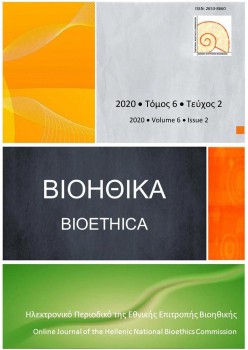Σοπενχάουερ περί Θανάτου και Αυτοκτονίας
Abstract
Για τον Σοπενχάουερ, η ζωή είναι ένας διαρκής πόνος, όπου «εν τέλει ο θάνατος πρέπει να θριαμβεύσει». (The World as Will and Representation I, 311) Παρ’ όλα αυτά, οι θέσεις του για τον θάνατο εμπεριέχουν μια ισχυρή δόση αισιοδοξίας. Υποστηρίζει ενθουσιωδώς ότι ο θάνατος, όχι μόνο δεν αποτελεί κάτι το κακό, αλλά είναι αντίθετα ένας φίλος που πρέπει να θεωρείται ευπρόσδεκτος. Είναι πεπεισμένος, επιπλέον, ότι μπορούμε να χρησιμοποιήσουμε τη γνώση και τη λογική μας, προκειμένου να πολεμήσουμε τον φόβο του θανάτου. Κατά ενδιαφέροντα τρόπο, όμως, στο σημείο όπου ο αναγνώστης περιμένει μια φιλοσοφική υποστήριξη της αυτοκτονίας, ο Σοπενχάουερ επιχειρηματολογεί με σθένος εναντίον της. Η αυτοκτονία, προκειμένου να αποφευχθεί ο πόνος και τα βάσανα, σύμφωνα με εκείνον, αποτελεί ένα λάθος, μια μάταιη, ανόητη και εγωιστική πράξη. Όχι μόνο δεν προσφέρει μια γνήσια λύση στο πρόβλημα του πόνου, θεωρεί, αλλά επιπλέον στέκεται εμπόδιο στην πραγματική σωτηρία, την άρνηση της βούλησης.
Στο κείμενο αυτό, υποστηρίζω ότι η καταδίκη της αυτοκτονίας του Σοπενχάουερ έρχεται σε σύγκρουση με τις γενικότερες θέσεις του για τον θάνατο και μπορεί να εξασθενίσει την επιχειρηματολογία του κατά του φόβου του θανάτου. Θεωρώ ότι οι ιδέες του πεσιμιστή φιλοσόφου για την αυτοκτονία πηγάζουν - κατά ειρωνικό τρόπο- από την υπέρμετρη αισιοδοξία του αναφορικά με τη δυνατότητα της αληθινής σωτηρίας. Όσον αφορά την απελευθέρωσή μας από τη βούληση, όμως, είναι προτιμότερο να παραμείνουμε απαισιόδοξοι. Κάτι τέτοιο, όπως εξηγώ, θα μας επιτρέψει να δούμε, όπως ακριβώς μας παροτρύνει και ο Σοπενχάουερ, με θετικό τρόπο τον θάνατό, βρίσκοντας παρηγοριά στο γεγονός ότι, άσχετα αν αυτός είναι αποτέλεσμα γηρατειών, ασθένειας, ατυχήματος ή αυτοκτονίας, δεν έχουμε λόγο να τον φοβόμαστε.
Article Details
- Come citare
-
Papadaki (Λίνα Παπαδάκη) L. (2020). Σοπενχάουερ περί Θανάτου και Αυτοκτονίας. Bioethica, 6(2), 7–19. https://doi.org/10.12681/bioeth.24835
- Fascicolo
- V. 6 N. 2 (2020): Bioethica
- Sezione
- Original Articles

TQuesto lavoro è fornito con la licenza Creative Commons Attribuzione 4.0 Internazionale.
Authors who publish with this journal agree to the following terms:
- Authors retain copyright and grant the journal right of first publication with the work simultaneously licensed under a Creative Commons Attribution CC BY 4.0 License, which allows for immediate free access to the work and permits any user to read, download, copy, distribute, print, search, or link to the full texts of articles, crawl them for indexing, pass them as data to software, or use them for any other lawful purpose. Appropriate credit must be given by citing the author(s) and the original publication in this journal.
- Authors are able to enter into separate, additional contractual arrangements for the non-exclusive distribution of the journal's published version of the work (e.g. post it to an institutional repository or publish it in a book), with an acknowledgement of its initial publication in this journal.
We encourage authors to deposit their articles, as well as data underlying the publications, in institutional and/or other appropriate subject repositories.
Bioethica permits and encourages authors to archive the final publication pdf in institutional (e.g. the repository of the National Hellenic Research Foundation) or other appropriate subject repositories (e.g. SSOAR repository for social sciences), in compliance with institutional and/or funder open access policies, after publication in the BIOETHICA. Authors must provide bibliographic details that credit publication in the journal, as well as related funding details (when applicable).
Lists of institutional and other subject-based academic open access repositories can be found listed by country at the registry http://opendoar.org/countrylist.php
If your institution does not possess a repository you may deposit a copy of your paper at no cost with www.zenodo.org , the repository supported for open access research in the EU by the European Commission, through the project OpenAIRE (www.openaire.eu )



